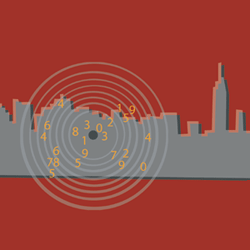 | |
| { The Metronome } Steve May illustration by Beth Sullivan
One hour, forty-five minutes later, I finally boarded a bus. I'd made an acquaintance in line with a young woman named Tonya, an industrial design student at Pratt in Brooklyn. The two of us settled into seats two-thirds of the way to the back, I along the window, she the aisle. The bus roared east onto Interstate 376, the snow-covered, tightly packed row houses of the South Side flats assembling below and to the right of us, and finally behind us, seeing us off. The Harrisburg bus station was small but nicer than the one in Pittsburgh, joined at the hip with a classic, old train station. We got in line. If they didn't have our bags, we were in trouble. If they had our bags but didn't have my coat, I was in trouble. My bus ticket was in my coat pocket, and I wasn't going to buy a third one. We were next, and then we were up. I made my way to the ticket window. In the summer of 2001, the first time I had come to the city as an adult, the blue towers of the World Trade Center kept watch over the lower, closer part of the skyline. Now, like an a grand, old diplomat called upon to lead his people in a time of need, the Empire State Building stood proudly, sadly alone. Its upper reaches had been lit yellow and orange when I left—to indicate "fall", someone told me. Now they were green and red, for Christmas. | |
 When I dragged myself off the couch at the bloodshot, dark grey hour of four-thirty Sunday morning, I was not looking for anything like adventure. I was just looking to get to the bus station and make it back to New York as quickly and easily and cheaply as possible. Thanksgiving weekend was a gas, but it was over for me, with the airy specter of the coming week increasingly above and all over everything, and it was time to leave.
When I dragged myself off the couch at the bloodshot, dark grey hour of four-thirty Sunday morning, I was not looking for anything like adventure. I was just looking to get to the bus station and make it back to New York as quickly and easily and cheaply as possible. Thanksgiving weekend was a gas, but it was over for me, with the airy specter of the coming week increasingly above and all over everything, and it was time to leave.